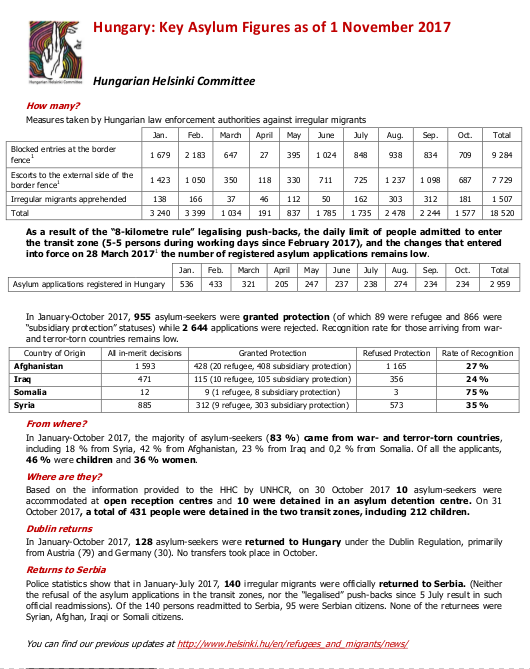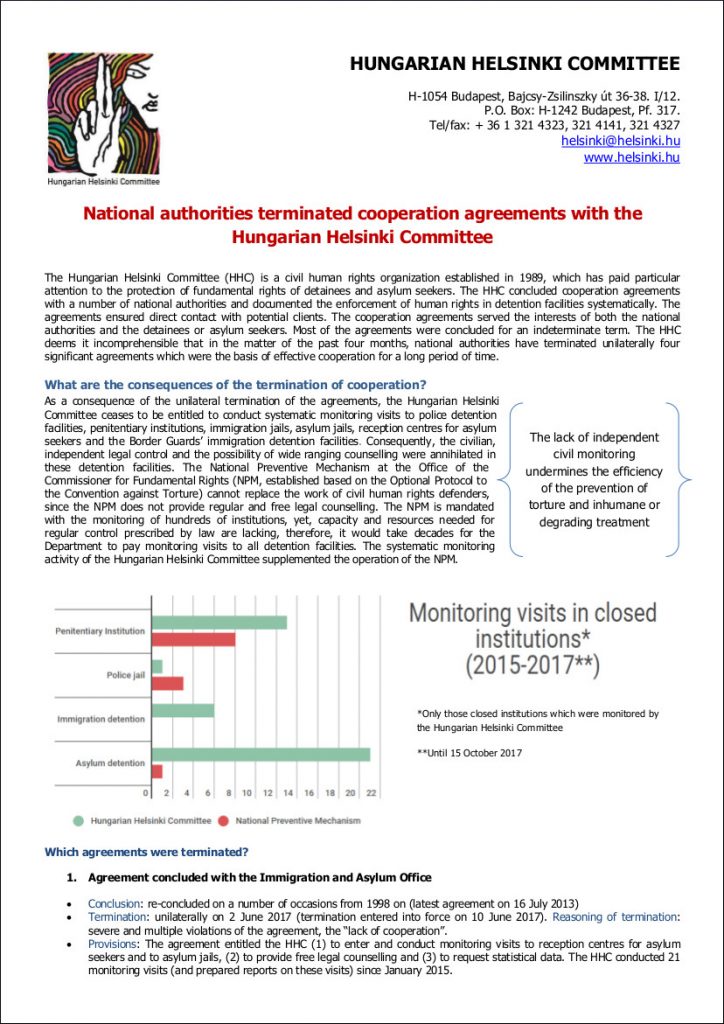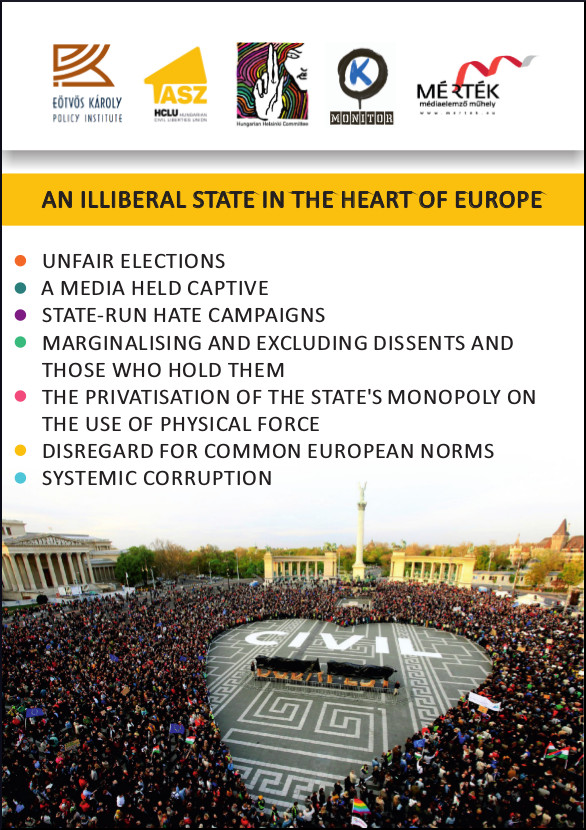Hungary’s leader criticised for calling investigation into Soros ‘network’
Civil society groups funded by billionaire George Soros denounced Hungary’s prime minister Viktor Orban on Sunday, for calling on his country’s security services to investigate the liberal philanthropist’s “network” and people associated with it. Mr Orban accuses Budapest-born Mr Soros of buying influence in the European Union and pressing it to admit millions of mostly Muslim immigrants, whom the Hungarian leader describes as a deadly danger to the bloc’s security and identity. “The Soros network has an extensive sphere of influence within the European Parliament and other EU bodies, and its aim is to build a Europe of mixed population and to condemn the Hungarian government for opposing their view on migration,” Mr Orban said on Friday.
National authorities terminated cooperation agreements with the Hungarian Helsinki Committee
Report of the fact-finding mission by Ambassador Tomáš Boček, Special Representative of the Secretary General on migration and refugees to Serbia and two transit zones in Hungary 12-16 June 2017
The Secretary General’s Special Representative on Migration and Refugees carried out a fact-finding mission to Serbia and two transit zones in Hungary from 12 to 16 June 2017. In Serbia he visited asylum and reception centres in Adaševci, Principovac, Krnjača, Subotica, Sombor, Bogovađa and Obrenovac and met with representatives of the government, the authorities responsible for asylum and migration-related matters, intergovernmental organisations, the European Union as well as civil society. In Hungary he visited the transit zones of Röszke and Tompa and met with the regional representatives of the asylum authority, as well as with the UNHCR and one NGO.
Hungary, being also a transit country for migrants and refugees travelling along the Western Balkans route, has also faced enormous challenges after the massive arrivals of migrants and refugees during 2015 and 2016. In response to these challenges Hungary has enacted a series of legislative amendments to the legal framework on asylum and immigration. Following those introduced in March 2017, all asylum-seekers, including families with children and unaccompanied children between 14 and 18 years old, are kept within specifically designated areas of transit zones located in Hungarian territory, while their asylum applications are processed. This situation raises concerns about de facto deprivation of asylum-seekers’ liberty under Article 5 of the ECHR. In particular, the confinement of children needs to be addressed as a matter of urgency. The primary consideration should be the best interest of the child. Every effort should be made to avoid resorting to the deprivation of liberty of migrant and refugee children on the sole ground of their migration status.
Violent pushbacks of migrants and refugees from Hungary to Serbia raise concerns under Articles 2 (the right to life) and 3 (prohibition of torture) of the ECHR. The restrictive practices of admission of asylum-seekers into the transit zones of Röszke and Tompa often make asylum-seekers look for illegal ways of crossing the border, having to resort to smugglers and traffickers with all the risks that this entails. The asylum procedures, which are conducted in the transit zones, lack adequate safeguards to protect asylum-seekers against refoulement to countries where they run the risk of being subjected to treatment contrary to Articles 2 and 3 of the ECHR. The mechanism for the judicial review of decisions of the asylum authority raises concerns in respect of the right to an effective remedy under Article 13 of the ECHR. The Council of Europe is ready to assist the Hungarian authorities, with expert advice, to safeguard the essence of the right to seek asylum in Hungary, while ensuring respect for asylum-seekers’ right not to be subjected to unjustified deprivation of liberty or unacceptable living conditions.
Unaccompanied asylum-seeking children between 14 and 18 years old who are in the transit zones are exempted from the scope of application of the legal provisions on guardianship. The assistance provided to these children from local social workers appears rather limited, which leaves unaccompanied children without adequate protection and support. As the stay of unaccompanied children in transit zones is intended for a short period of time there is no educational provision. The Council of Europe can provide assistance in developing a guardianship system that effectively protects the rights of the child and ensures compliance with the principle that the best interest of the child is the primary consideration in all processes affecting him/her.
In conclusion, it is necessary that the Hungarian legislation and practices are brought into line with the requirements of the ECHR. Should the Hungarian authorities decide to engage in this process, the Council of Europe is best placed to assist them by providing expert advice on the basis of the ECHR and the case-law of the European Court of Human Rights.
AN ILLIBERAL STATE IN THE HEART OF EUROPE
Kurzberichte aus den Transitzonen
# 1: After waiting for eight months in the camps of Serbia our time to enter Hungarian transit zones had finally arrived. We came to the border two days before and were really happy. My husband died in the war in Iraq and I have to take care alone of 4 children, the youngest of them being 4 years old. When we entered the transit zones, we were taken from one container to another. First checked by police, then doctor then fingerprints. I started to get lost, and do not remember much from that day apart from being very long and hot. There was a waiting room container where we had to stay all the time and the police was at the door making sure we do not get out. My young children wanted to get out and play, but they were not allowed. We entered Hungary between 09:30-10:00 and they took us to our sector and rooms only at around 19:00. I just remember it was an exhausting day.
Ungarns Grenzschutzkosten: Orbáns undurchsichtige Millionenrechnung
Ungarn fordert von der EU, sich mit 400 Millionen Euro an den Grenzschutzkosten zu beteiligen. Wohin das Geld fließt, will die Regierung aber nicht offenlegen. Dokumente zeigen: Parteinahe Firmen profitierten vom Zaunbau.
Hungary’s anti-migrant campaign takes root as villagers vent fury
When Zoltan Fenyesi offered a free holiday at his guesthouse to a group of refugees, he thought the act might become an example of Hungarian hospitality. By introducing them to his neighbours in Ocseny, a village of 2,300 in south-west Hungary, he hoped it might also prove the refugees posed no danger. Instead his offer last month provoked a vicious public backlash. A fraught town hall meeting called to discuss the invitation was captured on camera by local media, Mr Fenyesi received death threats and the clashes sparked an anguished national debate over how far ordinary Hungarians should go in fending off foreigners. In the process, Ocseny has become a byword for racial fear.
Here’s the questionnare that allows the people to have their say on the Soros Plan
1. George Soros wants to convince Brussels to resettle at least one million immigrants from Africa and the Middle East annually on the territory of the European Union, including Hungary as well.
Soros has been working for many years to change Europe and European societies. He wants to achieve his goal with the resettlement of masses of people from different cultural backgrounds. When presenting his plan, he described it like this: “[T]he EU has to accept at least a million asylum-seekers annually for the foreseeable future.” (Project Syndicate, September 26, 2015). The European Parliament supports a similar position. The public body has supported relocation programs and the establishment of immigration routes. (2015/2342. (INI))
Do you support this point of the Soros plan? ( ) YES ( ) NO
2. George Soros, together with leaders in Brussels, also plan to have the member states of the EU, including Hungary, take down the border protection fences and open the borders for immigrants.
Well-guarded borders mean effective protection against illegal immigration. It is no coincidence that the dismantling of the border protection fences is an important goal of the Soros plan. This way, borders would open to illegal immigrants. The billionaire said that “our plan treats the protection of refugees as the objective and national borders as the obstacle” (Bloomberg Business, October 30, 2015). Certain leaders in Brussels also heavily criticized border defenses. The commissioner for migration stated in June: it is not a good solution if member states of the EU erect fences on the outer borders.
Do you support this point of the Soros plan? ( ) YES ( ) NO
3. It is part of the Soros plan that Brussels redistributes immigrants gathered in Western European countries on a mandatory basis, referring in particular to Eastern European countries. Hungary would be required to take part in this as well.
George Soros wrote the following about the redistribution of immigrants: “If they do not become permanent and mandatory features of the common European asylum system, it will fall apart.” (Financial Times, July 26, 2015) In 2015, in Brussels, a decision was made that Hungary, as a first step, would be required to accept 1294 immigrants. Then, in 2016, the European Commission made a proposal to make it possible to redistribute immigrants in an unlimited number (IP/16/1620.). In harmony with George Soros’ proposal, the European Union Agency for Asylum is being established as well, which further erodes national authority over the issue of immigration. If resettlement quotas become effective, Hungarians will not have a say in the question of who they live together with in the future.
Do you support this point of the Soros plan? ( ) YES ( ) NO
4. Based on the Soros plan, Brussels should require every member state, including Hungary, to pay 9 million HUF in mandatory state aid for every immigrant.
According to Soros, significant amounts should be spent on immigrants. “The EU should provide €15,000 ($16,800) per asylum-seeker for each of the first two years to help cover housing, health care, and education costs – and to make accepting refugees more appealing to member states.” (Project Syndicate, September 26, 2015). According to the billionaire, this sum should be paid from loans. Soros proposes that taxes should be raised to pay the loans back. The billionaire would raise the value-added tax and taxes on gasoline and tourism. Last year, in Brussels, Soros also recommended that the EU, in order to overcome the migration crisis, should decrease agriculture and cohesion funds for Central European countries.
Do you support this point of the Soros plan? ( ) YES ( ) NO
5. George Soros would also like to see migrants receive lighter sentences for the crimes they commit.
George Soros, with significant amounts of funding, supports numerous organizations that assist immigration and defend immigrants who have committed unlawful acts. One example, the Hungarian Helsinki Committee, with regard to the prohibited crossing of the border argued that “the application of strict legal consequences with regard to unlawful entry may be considered concerning.” Another Soros-funded organization, Amnesty International, demanded numerous times that Ahmed H be set free, the man who was sentenced for attacking with stones Hungarian policemen defending the border. Amnesty would even have the Hungarian state pay compensation.
Do you support this point of the Soros plan? ( ) YES ( ) NO
6. The goal of the Soros plan is to diminish the importance of the language and culture of European countries in order to make the integration of illegal immigrants happen sooner.
George Soros writes in his book entitled “Open Society” that the “decline in those powers [of the sovereign state], ought to be a welcome development.” Soros has also spoken openly about not giving up the conviction that migration is benefiting Europe. He has called upon non-governmental organizations (NGOs) and companies to become sponsors of immigration. He also said the continent should finally take active steps to establish open societies. Even today, in some European countries and multinational companies, they voluntarily remove European and Christian symbols, so that they do not “hurt the sensibilities of the immigrants.”
Do you support this point of the Soros plan? ( ) YES ( ) NO
7. It is part of the Soros plan to launch political attacks on countries objecting to immigration and impose strict penalties on them.
The biggest obstacles in the execution of the Soros plan are the governments that make a stand for national sovereignty and oppose illegal immigration. Soros cannot yet bring one million immigrants into Europe today because there are governments that object to this. The Hungarian government fulfills the Schengen Agreement when it protects the borders and builds a fence to impede the execution of the Soros plan. Soros and a number of decision-makers in Brussels assail our homeland for that reason. According to a proposal of the European Commission, member states that do not participate in the resettlement program would have to pay a 78 million HUF penalty for each migrant (2016/0133. (COD)). A Hungarian worker would have to labor for decades to earn such an amount.
Do you support this point of the Soros plan? ( ) YES ( ) NO
Returning the questionnaire is free of charge
Deadline for posting: November 24
Publisher: Cabinet Office of the Prime Minister (1055 Budapest, Kossuth Lajos tér 1–3.)
ECtHR – Ilias and Ahmed v. Hungary, Application No. 47287/15, 14 March 2017
On the 18 September 2017 the Grand Chamber decided to accept the referal by the Hungarian government to the Chamber. A final judgment in the case is, therefore, pending.



